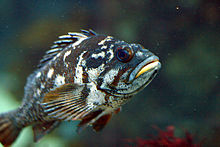Sebastinae is a subfamily of marine fish belonging to the family Scorpaenidae in the order Scorpaeniformes. Their common names include rockfishes, rock perches, ocean perches, sea perches, thornyheads, scorpionfishes, sea ruffes and rockcods. Despite the latter name, they are not closely related to the cods in the genus Gadus, nor the rock cod, Lotella rhacina.
| Sebastinae | |
|---|---|
 | |
| Gopher rockfish, Sebastes carnatus | |
| Scientific classification | |
| Domain: | Eukaryota |
| Kingdom: | Animalia |
| Phylum: | Chordata |
| Class: | Actinopterygii |
| Order: | Scorpaeniformes |
| Family: | Scorpaenidae |
| Subfamily: | Sebastinae Kaup, 1873 |
| Genera | |
|
see text | |
Taxonomy
Sebastinae, or Sebastidae, was first formally recognised as a grouping in 1873 by the German naturalist Johann Jakob Kaup.[1] Some authorities recognise this family as distinct from Scorpaenidae. FishBase, a finfish database generated by a consortium of academic institutions, does,[2] but the United States Federal government's Integrated Taxonomic Information System[3] and the 5th Edition of Fishes of the World do not, FotW classify it as a subfamily of the Scorpaenidae.[4]
Tribes and genera
Sebastinae is divided into two tribes and seven genera:[4][5]
- Tribe Sebastini Kaup, 1873
- Helicolenus Goode & Bean, 1896
- Hozukius Matsubara, 1934
- Sebastes Cuvier, 1829
- Sebastiscus Jordan & Starks, 1904
- Tribe Sebastolobini Matsubara, 1943
- Adelosebastes Eschmeyer, T. Abe & Nakano, 1979
- Sebastolobus Gill, 1881
- Trachyscorpia Ginsburg, 1953
Characteristics
Sebastinae species have a compressed body with the head typically having ridges and spines. The gill membranes are not attached to the isthmus. There is a venom gland in the spines of the dorsal, anal and pelvic fins. The largest species is the shortraker rockfish ( Sebastes borealis) which attains a maximum total length of 108 cm (43 in) while the smallest species is Sebastes koreanus which reaches a maximum total length of 13.7 cm (5.4 in).[2]
Distribution and habitat
Sebastinae rockfishes are found in the Pacific, Indian and Atlantic Oceans with most species in the largest genus, the ovoviviparous Sebastes with over 100 species, in the North Pacific. They can be found in marine and brackish waters.[2]
References
Wikiwand in your browser!
Seamless Wikipedia browsing. On steroids.
Every time you click a link to Wikipedia, Wiktionary or Wikiquote in your browser's search results, it will show the modern Wikiwand interface.
Wikiwand extension is a five stars, simple, with minimum permission required to keep your browsing private, safe and transparent.
